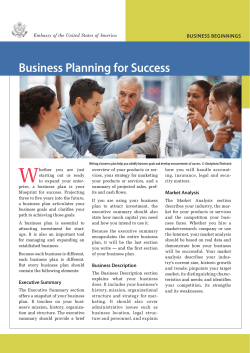
E l i h d h Exploring why and how
EExploring why and how l i h dh deliberative processes can support the development of healthy public policies yp p Web Presentation│March 2013 François‐Pierre François Pierre Gauvin, PhD Gauvin PhD 1 National Collaborating National Collaborating Centre for Centre for Healthy Public Policy (NCCHPP) Our mandate – to increase the expertise of public health actors across Canada in healthy public policy through the development, sharing and use of knowledge. Our areas of expertise – – – – The effects of public policies on health Generating and using and using knowledge about policies about policies Intersectoral actors and mechanisms Strategies g to influence policy p y makingg 2 The National Collaborating Centres for Public Health 3 Obesity (Groupe de travail sur la problématique du poids, 2004, p. 12) 4 A few assumptions about the world we live in… A few assumptions about the world we live in… 1. We are facing complex public health problems y p y p g 2. There is a lot of uncertainty about the policy options for addressing these problems (i.e. effectiveness, unintended effects, feasibility, costs, acceptability, equity, etc.) 3 We can’tt act alone to address these problems 3. We can act alone to address these problems 5 © iStockphoto.com/ john shepherd We need mechanisms… We need mechanisms… 1. To develop a shared understanding of these problems 2 To better understand what policy options work and in what context 2. To better understand what policy options work and in what context 3. To reach agreement and trigger action 6 © iStockphoto.com/ john shepherd Deliberative processes appear promising for tackling complex public health problems tackling complex public health problems 7 © iStockphoto.com/alxpin Objectives 1. What is a “deliberative process”? 2 2. What do they have in common and how do they vary? What do they have in common and how do they vary? 8 Part 1. What is a deliberative process? 9 © iStockphoto.com/alxpin Deliberation 1. thoughtful, careful, or lengthy consideration 2. formal discussion and debate, as of a committee, jury, etc. 3. care, thoughtfulness, or absence of hurry, esp. in movement or speech Consulted on November 6, 2012: http://www.collinsdictionary.com/dictionary/english/deliberation?showCookiePolicy=true 10 Deliberative process Deliberative process A process allowing a group of actors to receive and exchange information, to critically i i ll examine an issue, and to come to an agreement which i i d hi h will ill inform decision making (Inspired by: Fearon, 1998) 11 Two bodies of literature Deliberative democracy Knowledge translation 12 Two bodies of literature Deliberative democracy Knowledge translation 13 Abelson (2010) on ‘deliberative processes’ “Individuals with different backgrounds, interests, and values listen, learn, and potentially persuade and ultimately come to more reasoned, informed, and public spirited judgments.” 14 Why deliberate? Increase the public accountability of decision‐making processes Consider the values, needs, preferences, and experiential knowledge of the public Implement a governance model facilitating consultation and partnership Provide guidance in the context of social and ethical dilemmas Ensure that decisions are both relevant and acceptable 15 Two bodies of literature Deliberative democracy Knowledge translation 16 Different kinds of e e t ds o evidence Political judgment Professional P f i l experience and expertise Habits and tradition Values Scientific evidence Resources Pragmatics Pragmatics and contingencies Lobbyists and pressure groups (Lomas, Culyer, McCutcheon, McAuley & Law, 2005, p. 17) 17 CHSRF(2006) on ‘deliberative processes’ “A deliberative process is a tool for producing guidance based on heterogeneous evidence. It is a participatory process that includes representation from experts and stakeholders, face‐to‐ face interaction, criteria for the sources of scientific evidence and their weight, and a mechanism for eliciting colloquial and their weight, and a mechanism for eliciting colloquial evidence while making it subsidiary to the science.” Canadian Health Services Research Foundation, 2006, p. 7 18 Why deliberate? Promote the co‐production and co‐interpretation of research Generate new evidence based on experiential knowledge Generate new evidence based on experiential knowledge Contextualize evidence Provide Provide policy guidance that considers policy guidance that considers all the different sources of all the different sources of evidence 19 Part 2. What do they have in common and how do they vary? y y 20 © iStockphoto.com/alxpin 21 What do they have in common? What do they have in common? A group of persons who meet face‐to‐face and/or virtually Receive and exchange information about an issue Critically examine the issue An explicit process for gathering individual and collective input 22 At least four dimensions can vary Goals Composition of group f Policy‐making proximity Procedural aspects (Adapted from: Lavis, Boyko, Oxman, Lewin et Law, 2009) 23 Goals + Develop strategic plan Formulate recommendations Formulate value statements Particip pants’ degree of pow wer Make a decision Dialogue Inform © iStockphoto.com/Keith Webber Jr. 24 Group composition Group composition Experts Civil Civil society Decision makers 25 Group composition (2) – the size Group composition (2) the size 26 50 26‐50 15‐25 100 100+ 51‐100 26 Group composition (3) – selection Group composition (3) Random C it i Criteria‐ based ((e.g., civil g, lottery) Open to all Participants 27 What is policy‐making proximity? Proximal Initiated and Initiated by Initiated by db NGO(s) but sponsored by sponsored by gov’t. IInitiated and iti t d d sponsored by NGO(s) gov’t. Distal (Adapted from: Dobrow, 2010) 28 Procedural aspects Information / material (e.g., workbook, statements) ( g, ggroup vs. plenary) p p y) Deliberative format (e.g., small Deliberative rules (e.g., Chatham House Rule) (Lavis et al., 2009) 29 Two examples Two examples 30 Example 1 The Strategic Meeting on Health 31 The Strategic Meeting on Health • Initiated in 2005 by the Institut Initiated in 2005 by the Institut du Nouveau Monde du Nouveau Monde • 8 regional public dialogues across the province of Québec • 1 national public dialogue in Montréal • 175 citizens and 20 expert witnesses 175 iti d 20 t it Overarching objective Overarching objective • Achieve a vision of the Québec that citizens aspired to live in 20 years from now Five dilemmas 1. 2 2. 3. 4. 5 5. Is health an individual or a collective responsibility? Is the role of the state to prevent or cure? Is the role of the state to prevent or cure? What should be the public and private sector roles in healthcare? Should we pay more or should we reduce the Medicare basket? Wh h ld d id b Who should decide: bureaucrats, physicians, politicians or citizens? t h i i liti i iti ? 32 E.g. - Health Impact Assessment - Creating an “Office for Public …Hearings on Health” www.inm.qc.ca q (Institut du nouveau monde, 2005) 33 Example 2 The Stakeholder Dialogue on Housing for people with HIV/AIDS 34 The Stakeholder Dialogue The Stakeholder Dialogue • Organized in 2010 by the McMaster Health Forum, with support from the Ontario HIV Treatment Network, CIHR, and MOHLTC Overarching objective •Examine issues that make it difficult to provide services that meet the housing and health needs of people with HIV/AIDS, 3 options for g p p / , p addressing these issues, and key implementation considerations 4‐step process 1. Preparatory consultations to frame and characterize the problem and th three possible policy options to address it ibl li ti t dd it 2. Before the event, prepare and circulate an evidence brief that mobilizes relevant research evidence about the problem, as well as three p , policy options and their implications 3. Fifteen to eighteen officials, leaders, citizens and researchers are convened for an off the record dialogue (Chatham House Rule) convened for an off‐the‐record dialogue (Chatham House Rule) 4. After the event, prepare and circulate a dialogue summary 35 www.mcmasterhealthforum.org (Lavis, 2010) 36 Comparison Example The Strategic Meeting on Health McMaster Health Forum Deliberative trend Deliberative D lib ti democracy Knowledge translation Main goal Group Formulate recommenda tions Civil society Dialogue Hybrid (i.e., policy makers, experts and experts, civil society) Size +175 18‐22 Policy‐ making proximity Procedural aspects Open to all Initiated and sponsored by NGO E.g., Experts’ statements dd b t and debates, small group and plenary deliberations Purposeful Initiated by NGO but sponsored by gov’t. E.g., evidence brief, plenary deliberation, Chatham Chatham House Rule Selection 37 Conclusion & Wrap up Conclusion & Wrap‐up 38 Deliberative processes appear promising… Deliberative processes appear promising… 1. To develop a shared understanding of these problems 2 To better understand what policy options work and in what context 2. To better understand what policy options work and in what context 3. To reach agreement and trigger action 39 © iStockphoto.com/ john shepherd References • Abelson, J. (2010). Délibération publique et gouvernance démocratique : théories, pratiques et données probantes. Journées annuelles de santé publique du Québec Montréal March 12 2010 [PowerPoint slides] Retrieved from: publique du Québec, Montréal, March 12 2010. [PowerPoint slides]. Retrieved from: http://www.ncchpp.ca/docs/DeliberationJASP2010_AbelsonEN.pdf • Canadian Health Services Research Foundation. (2006). Weighting up the evidence: Making evidence‐informed guidance accurate, achievable, and acceptable. Ottawa, Canada: Canadian Health Services Research Foundation. Retrieved from: http://www.chsrf.ca/migrated/pdf/weighing_up_the_evidence_e.pdf • deliberation. (n.d.). Collins English Dictionary. Consulted on November 6, 2012: http://www.collinsdictionary.com/dictionary/english/deliberation?showCookiePolicy=true • Dobrow, M. (2010). Deliberative methods for combining different types of evidence in the development of policy recommendations. Journées annuelles de santé publique du Québec, Montréal, March 12 2010. [PowerPoint slides]. Retrieved from: http://www.ncchpp.ca/docs/DeliberationJASP2010_DobrowEN.pdf • Fearon, J. D. (1998). Deliberation as discussion. In J. Elster (Ed.), Deliberative democracy. (pp. 44‐68). Cambridge: Cambridge University Press. • Groupe de travail sur la problématique du poids. (2004). Weight problems in Québec: Getting mobilized. Montréal, Québec: Association pour la santé publique du Québec. Retrieved from: http://www.aspq.org/uploads/pdf/4cd97591b55139‐weight‐problems‐in‐quebec‐getting‐mobilized.pdf • Institut du nouveau monde. (2005). 100 idées citoyennes pour un Québec en santé. Fides. • Lavis, J. N. (2010). Dialogue summary: Adressing housing challenges faced by people with HIV in Ontario. Hamilton, Canada: McMaster Health Forum. Retrieved from: http://digitalcommons.mcmaster.ca/mhf_dialogue‐summaries/16/ • Lavis, J. N., Boyko, J. A., Oxman, A. D., Lewin, S., & Fretheim, A. (2009). SUPPORT Tools for evidence Lavis J N Boyko J A Oxman A D Lewin S & Fretheim A (2009) SUPPORT Tools for evidence‐informed informed health Policymaking (STP) 14: (STP) 14: Organising and using policy dialogues to support evidence‐informed policymaking. Health Research Policy and Systems, 7(Suppl. 1), 1‐8. doi: 10.1186/1478‐4505‐7‐S1‐S14 • Lomas, J., Culyer, T., McCutcheon, C., McAuley, L., & Law, S. (2005). Conceptualizing and combining evidence for health system guidance. Ottawa, Canada: Canadian Health Services Research Foundation. Retrieved from: http://www.chsrf.ca/Migrated/PDF/insightAction/evidence_e.pdf 40 You’re interested in this topic? Visit us at www.ncchpp.ca for more resources on deliberative processes. Author: François‐Pierre Gauvin, PhD Editor: Marie‐Christine Editor: Marie Christine Hogue Hogue Narrator: Michael Keeling 41
© Copyright 2025










